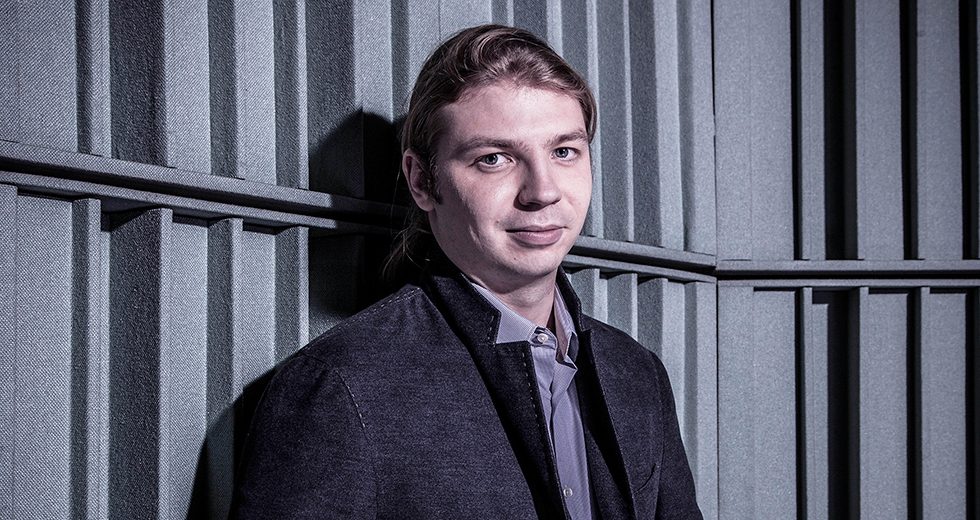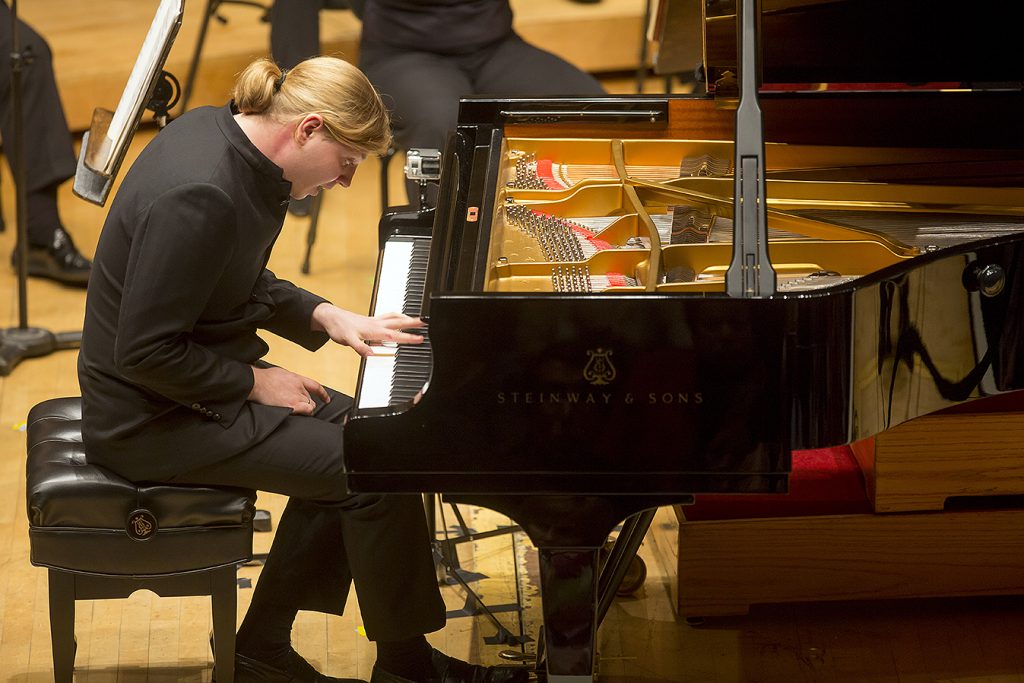
Denis Kozhukhin knows well the stereotypes associated with Russian pianists: that they’re players with massive techniques who thrive on the big Russian and Romantic-era concertos. But the rising young pianist, a native of Nizhny Novgorod, rejects such notions. One of his favorite interpreters of Russian music was American pianist Van Cliburn, famous for winning the 1958 International Tchaikovsky Competition in Moscow during the height of the Cold War. “People think that if you’re a Russian pianist,” he said from his home in Berlin, “then you are great with Tchaikovsky, Rachmaninov and probably Prokofiev and Stravinsky, but you have no idea of Beethoven, Haydn or Schubert, and you’d never be able to do a good Mozart concerto. That’s completely not correct. This picture of a Russian pianist banging the hell out of a piano, that’s nuts.”
In his repertoire of some 35 works for piano and orchestra, Kozhukhin acknowledges that many of them are Russian concertos. But he also loves to play recital works by Haydn and even those of Handel: “I like to play Handel because I think his suites are of equal quality to the Bach suites or partitas, but for some reason, you have a bunch of concerts everyday where you can find Bach but not Handel.” If all that is not enough, the pianist also delves into contemporary compositions by Pierre Boulez and others. “I don’t like to set limitations,” he said. “I simply like too many things.”

For his CSO debut in June 2015, Denis Kozhukhin performs Ravel’s Piano Concerto for the Left Hand. | ©Todd Rosenberg Photography 2015
When Kozhukhin made his debut with the Chicago Symphony Orchestra in June 2015, he played a most un-Russian work: Ravel’s Piano Concerto for the Left Hand. Of Kozhukhin’s CSO debut, Chicago Tribune critic John von Rhein wrote: “His firm tone, incisive attacks and supple sense of line made light of the work’s enormous technical difficulties. Especially in the formidable cadenza that closes the concerto, it was hard to believe he could deliver such commanding sound and spot-on accuracy using only five fingers.”
For his second set of CSO appearances on Nov. 17-19 and 22, Kozhukhin will be heard in a decidedly Russian work: Prokofiev’s Piano Concerto No. 2. It is Kozhukhin’s favorite among the composer’s five works in that form. He first heard the piece when he was around 12 years of age, and his piano teacher at the time, Natalia Fish at the Balakirev School of Music, had him listen to a recording of it. “I got really obsessed with the piece,” Kozhukhin said. “I copied the recording, and for months, literally every night before going to sleep I would hear it again and again.” He found the score of the work in his family’s music library and tried to play it, even though it was too complicated for him. “But the dream of doing this piece once in my life was already there,” he said. When he did finally learn the concerto, it gained even greater significance. It was the work, for example, that carried him to victory in an important competition, and he has played it with pianist and conductor Vladimir Ashkenazy, one of its most respected interpreters.
To get a further sense of Kozhukhin’s interpretative range and formidable skill, consider that during concerts Oct. 26-27 with the Toronto Symphony as part of “The Decades Project: 1920-1929,” he performed both Rachmaninov’s Piano Concerto No. 4 and Gershwin’s Rhapsody in Blue on the same program. If that wasn’t enough of a challenge, it was also the first time he had ever tackled the latter. The pairing, which was the idea of guest conductor Kristjan Järvi, made sense because Rachmaninov heard Gershwin perform and knew his music, and that influence can be heard in the Concerto No. 4. “This piece is really unique not only among his piano concertos but also in his whole piano repertoire, because it has this crazy mixture of jazzy things, nostalgia and his own language,” he said. “So I thought it was a brilliant idea to put the two pieces together.”
The most daunting compositional twosome Kozhukhin has ever performed was Brahms’ Piano Concerto No. 2 and Prokofiev’s Piano Concerto No. 2 during a concert in Beirut. Although this latest pairing might not have been quite as physically demanding, it was still mentally taxing. “The Rach 4 is a concerto in which you really cannot sit back and relax,” he said. “It’s very challenging on its own, because the text is really complex, and the orchestration very complicated. So for me, of all the Rachmaninov concertos, it’s my favorite one but it’s mentally the most tiring one. So then to go out and play the Rhapsody in Blue, although it was my first time, was kind of relaxing.” Järvi and he would like to find other orchestras with which they could try the two works together again.
After beginning piano lessons in Russia, Kozhukhin made the surprising choice at age 14 to move to Madrid — not exactly a major classical-music center — to continue his studies at the Reina Sofía School of Music. The decision was all about his desire to study with famed Russian pianist and teacher Dimitri Bashkirov, who was teaching there. Bashkirov doesn’t typically mentor anyone so young, but he made an exception in Kozhukhin’s case, and the pianist stayed from 2000 through 2007. He wound up falling in love with Spain, and Spanish has become his most polished language after Russian.
Though Kozhukhin had already a received few lesser piano prizes, his victory at the 2010 Queen Elisabeth Competition in Brussels thrust him into the international spotlight. “The Brussels competition did for me what competitions are supposed to do for a young musician,” he said. “They allow people to know you better. A major competition is a very focused moment, especially when it gets closer to the finals. And you meet people that you need to keep going, like managers, orchestra directors and promoters.”
In 2015, he was signed by the well-regarded label, Pentatone, and his first release, which featured Grieg’s Piano Concerto and Tchaikovsky’s Piano Concerto No. 1, won several honors, including an editor’s choice from Gramophone magazine. His second album, a collection of solo works by Johannes Brahms, is set for release in January.
Kyle MacMillan, former classical music of the Denver Post, is a Chicago-based arts journalist.